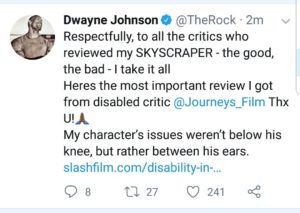Kristen Lopez on The Rock and The Ghost and Disabled Characters in Movies
Posted on July 14, 2018 at 5:17 pm

My friend Kristen Lopez is also one of my favorite critics, knowledgeable, forthright, passionate, and always willing to engage on issues of representation. Recently, she stared down a bunch of rabid fanboys who were upset (“Hey, it’s a MOVIE!”) on Twitter because she called out “Ant-Man and the Wasp” for the tired trope of the disabled bad guy, driven to do bad things because of the disability.
Ant-Man and the Wasp’s treatment of disability will go under the radar. But in a landscape where disability remains marginalized, particularly for women of color (and people of color in general), a character like Ava could have helped opened the door. Chronic pain remains a hot-button issue in the disabled community, and having Ava live with it could have presented something relatable. Instead, Ava is stripped of her problem in order to make her rational, quantifiable, and controllable.
I was interested to see how she would react to Dwayne Johnson’s portrayal of a disabled character in “Skyscraper.” While I prefer to see disabled characters played by disabled actors, I also recognize the idea that any actor should be able to play any part. Until ordinary characters — teachers, accountants, doctors, scientists, parents, children — are shown with disabilities that are not central to their identity and are played by actors with disabilities, I think we should be careful about putting able-bodied people in those roles. And no body is more able than The Rock.
Lopez called Johnson’s portrayal “surprisingly nuanced” and “far better” than what we usually see.
First, she says, “the adversity is the building itself, not Will’s disability….By not making a big deal of his disability, Will is a character who represents a marked improvement in representation. People with disabilities don’t want their disability to define them, and Will’s doesn’t define his character. It adds to it…. His character doesn’t walk away a changed man appreciating being disabled. He gets his family back and seemingly ends the film the same way he started. It’s just a facet of his personality he deals with in order to overcome this great challenge.”
But, she has some concerns as well. “The character is also written to fall into the “able-bodied buffer” category, a term I use to describe any character shown as previously able-bodied before a traumatic event. This ‘buffer’ is created as a means of helping the able-bodied audience bond with the newly disabled character, under the belief that disabled people are so mysterious that there’s no point of entry for the audience short of reminding them the character was one ‘like you.'”
I wasn’t the only one who appreciated this review.
Wow. I am officially verklempt. @TheRock thanks for taking the time to read my piece! Disabled representation has a long road to travel, but I was happy to see movement being made. pic.twitter.com/KvhPq5MvlR
— Kristen Lopez (@Journeys_Film) July 13, 2018

